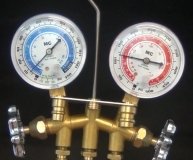Hi dkparker. Welcome to the forum. You do not replace "the entire unit" to repair the system. There are many parts to the system, and to replace everything would run into many thousands of dollars. They probably replaced one major part last time. Regardless, the symptom you described is typical of a system that is low on charge and needs to have refrigerant added. It is normal for systems to leak slowly over time and have to be recharged. The newer R-134 isn't quite as damaging to the atmosphere as the older R-12, but it has smaller molecules so it leaks faster.
An air conditioning specialist will use an electronic leak detector to check for leaks before recharging the system. You can also make some observations yourself. Check the rubber hoses, particularly where they are crimped to a metal connector. Oil residue is a sign of leakage. Oil circulates in the system and will remain at the point of a leak while the refrigerant will evaporate. Look around the front of the compressor too by the pulley. You can also use a mixture of water and liquid dish soap wiped onto connectors. Leaks will cause bubbles to form in the soap. Leaks must be repaired first, then the system can be recharged. Overcharging the sytem can be damaging to the compressor. On most cars other than Chrysler products, it is impossible to know exactly when the system is fully charged. Your mechanic may advise that he needs to drain the remaining refrigerant, then install a measured amount so he knows it is correct.
From the way you described the symptoms, it is obvious there is not a catastrophic component failure because the system still does work. The question is whether or not there is a leak and what it will take to fix that leak.
Caradiodoc
Monday, May 31st, 2010 AT 1:19 PM


